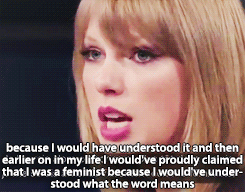Girls, go out and have your fun: Your Feminist Theory Reading List
"Show & Tell: Feminist Theory" episode available now!
People love an ingenue. While every episode of AP Taylor Swift has been colored by feminist theory at least somewhat, we went all in this week! We dive into the dynamics of bullying in “Mean,” the double standard of beauty and fame in “Nothing New,” and the expectation for women to always be performing in “mirrorball.” This episode is a little bit of laughter, a little bit of rage, and overall one of our favorite episodes to date!
🎧 Listen above and ⬇️ scroll below to read Jenn’s extra credit on what to do next if you want to dig into feminist theory more!
🎥 Sneak Peek
Catch excerpts from the podcast and behind-the-scenes content on YouTube, TikTok, and Instagram!
🛍️ Shop With Us! Active Discount Codes
As we grow, we are so excited to announce new partnerships! Here you’ll find active discount codes available to our listeners.
📚 Bookshop.org Check out all our book recommendations by episode
🔉Libro.fm Support your local bookstore while listening to great audiobooks
Code: APTS
Offer: Get a free audiobook when you start a new membership (you must use this link!)
Receive 2 audiobook credits for $14.99 USD with your first month of membership.Code: APTS30
Offer: 30% off specific audiobooks in the AP Taylor Swift playlist.
✨ Krowned Krystals Make the whole place shimmer with the best rhinestones
Code: APTS
Offer: 10% off your order when you use the link above
📜 This Week’s Extra Credit by Jenn
Doing a feminist theory episode has been on our list since day one, but we are only now getting around to it because we are kind of always doing feminist theory in a way. I like to think of literary theories as lenses through which you can analyze, discuss, and dissect texts. Sometimes that means really narrowing in on a concept, and sometimes you realize that your personal beliefs and experiences mean you kind of view most things through certain lenses. As three women who are always working to be better feminists, we’ve naturally brought in some gender commentary into most of our episodes. It’s honestly hard to avoid.
However, one thing I’ve learned about feminism is that I need to keep learning more. Many incredible women have dedicated their lives to educating and advocating for gender equality, so obviously this one Substack simply cannot cover it all. What I can do though is give you some high-level thoughts and then recommendations for further reading!
Becoming Feminists
When the Barbie movie came out in 2023, I remember a lot of mixed reviews on America Ferrera’s monologue about how impossible it is to be a woman. Some people thought it was reductive and overly simplistic. Other people’s lives were radically changed by it. In my personal opinion, that debate reflects the core of my opinions about feminism – start where you are, move forward, and don’t be ashamed of where you came from. Whether you’re 16 or 60, if you see or read something that makes feminism click in your brain and you want to learn more, that’s awesome! There can be a weird shame sometimes around not knowing “enough” as if there is a point where someone does know “enough?” Anyways, if anyone makes you feel ashamed about that, point me in their direction. I’ll take care of it.
The other thing I wanted to mention is the importance of intersectional feminism. As a white woman, I’ve definitely dealt with my fair share of nonsense, but I am acutely aware that the patriarchy in our country still affords me plenty of privilege. Intersectionality requires us to look at the layered factors of discrimination such as race, sexual orientation, religion, and more. Gender is important, but we are all a mix of identities and intersectional feminism acknowledges the complexity of that.
Getting Started With Feminist Literature
If you’ve listened to like two or more episodes of our podcast, you will have quickly noticed my affinity for history. I think understanding how we got to this point is very important in understanding where we need to go. The books I am going to recommend in the next couple of sections are mostly historical ones that are key texts in the history of feminism. I want to acknowledge that now because the origins of feminist movements were not particularly intersectional. I will add more modern recommendations at the end, but wanted to give context up front.
Published in 1899, this novel tells the story of a woman who basically realizes she hates her life and follows her journey as she wrestles with how to break free from the prescribed role she must fill as a woman. The book was banned for a long time due to the main character being “too sensual.” Reading it in modern times, it felt a little basic to me, but understanding the drama it created when it was published helps put into perspective how a woman’s basic desire to have some independence and be allowed to have literally any sexual desire was considered horrifying to society at the time. It helps set the stage for where we began in modern times.
Men Explain Things to Me by Rebecca Solnit
A much more modern book, this is actually a collection of essays published in 2014 by Rebecca Solnit. These are super accessible, pretty easy reads that shine a light on modern issues facing women. I have actually given this book to several male friends as a way for them to educate themselves on feminism, and it’s been incredibly impactful for them. It’s a great starting point if you aren’t as into older literature or want to start with something more contemporary.
Ready To Dig Deeper?
Unsurprisingly, some cornerstone feminist texts are incredible yet dense. I wanted to separate these out, because they can be life-changing, but may not be the best starting point if you are tiptoeing into this world for the first time. If you are ready to dig in deeper though, these are absolutely worth your time.
The Second Sex by Simone de Beauvoir
Published in 1949, The Second Sex is one of the greatest legacies of Simone de Beauvoir. De Beauvoir was one of the leaders of the existentialist movement in the early 20th century (along with her lifelong partner Jean-Paul Sartre), but as a female philosopher, she had a unique take on the existentialist movement. Written originally in French, this book definitely will require focus as it’s essentially a philosophical work that has been translated. However, it’s 100% worth it!
The Feminine Mystique by Betty Friedan
Written not too long after The Second Sex in 1963, Betty Friedan’s book specifically challenges the idea that women are built to be fulfilled only by being a wife and a mother. Her research and subsequent work proved that many housewives were deeply unsatisfied by their lives. If you’ve ever seen Mad Men, Betty Draper’s plotline aligns with a lot of the real stories and frustrations that Betty Friedan writes about in this book.
The Journey of Feminism
This substack is already too long, so I’ll stop here and provide you a link to another list that covers a much wider range of books – 40 Essential Feminist Books to Read for Women's History Month by Harper’s Bazaar. This list includes way more books by a diverse range of authors. The ones I listed were all written by white women and most of them were older, so please check out this list to get a better range of options to check out!
I know sometimes reading books in a time where women’s rights feel in danger can seem lackluster and selfish. But while advocacy and action are incredibly important, there’s a reason leaders throughout history have burned and banned books when they are trying to seize power. Ensuring that you are well-educated and aware is truly an act of radical defiance in a culture that eschews knowledge. Donate to causes. Participate in protests. Learn about the women who fought for their rights before us. All of these things are powerful, good things to do when you are feeling helpless or scared. And if you aren’t in the mood to read, but you need something, check out this amazing documentary about Ruth Bader Ginsburg. We could all use some inspiration from the great dissenter these days.










